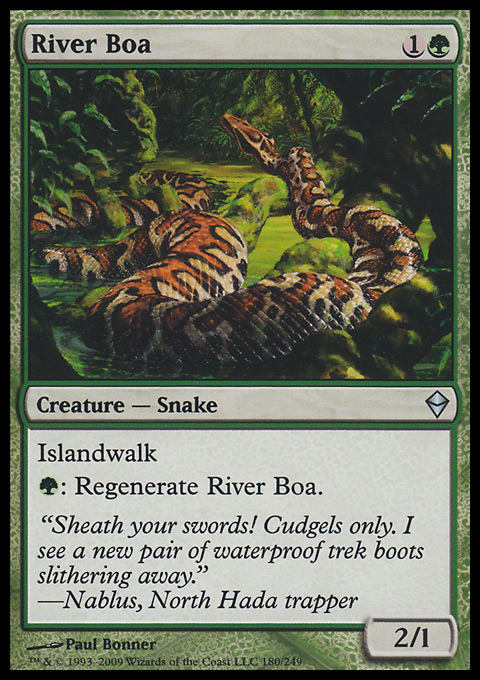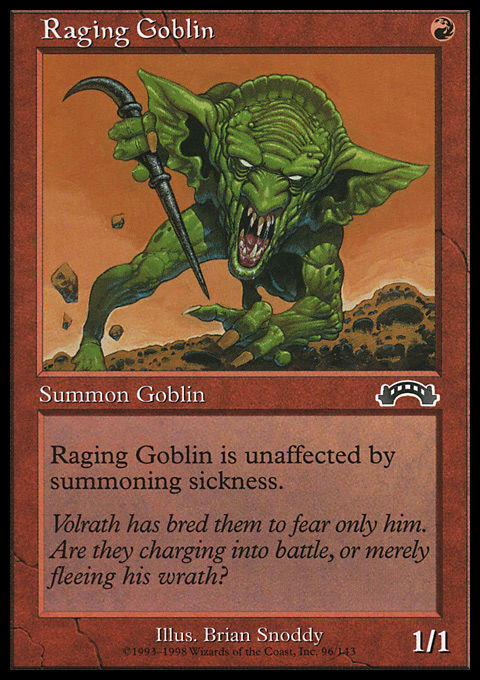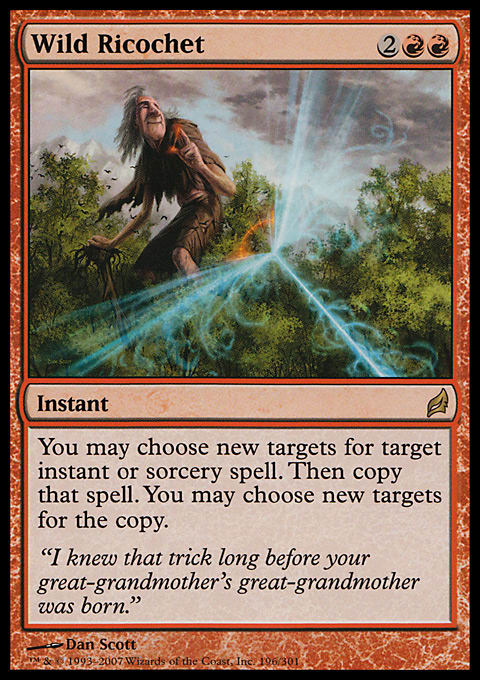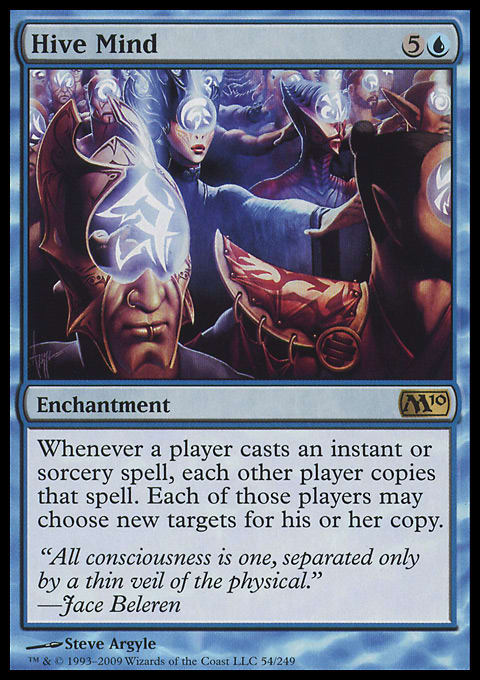The game started slowly, with each player dropping lands on the first couple of turns. Jean had an early River Boa and took the opportunity to get a free shot in against Kelly, who was sitting on Jean’s left. On the next turn, Jean went after Chris, the player sitting on Kelly’s left.
“You don’t want to do that,” Chris warned. Chris wouldn’t say anything more and left the warning hanging out there. Everyone at the table knew what the warning meant. Chris regularly attacked whoever attacked him first until he was satisfied that it was even. That often amounted to several dead creatures and 10 or more damage.
Jean was not to be deterred. “Sorry, Chris, you are next up,” and attacked for 2. Chris shook his head and took the 2 points of damage.
Over the next six turns, every creature he played attacked Jean. An artifact was destroyed, two minor spells were countered, and 12 damage was dealt.
Definitions
A recent episode of CommanderCast1 spent some time discussing this all-too-common scene in casual games involving multiple players. I want to take this opportunity to look at this common strategy in the hopes of addressing how it affects playgroups and appropriate responses.
To properly discuss the topic, we need to make it clear what is being discussed. Precision is important.
First, let’s look at the player who has taken the initiative and made the attack. For ease of discussion, let’s call that player Jean. In the situation discussed, Jean is not repeatedly targeting the other player in question (Chris).2 If Jean was repeatedly going after Chris, you’d expect Chris to defend himself and respond in kind. If Jean attacked repeatedly with a single River Boa, with no way to defend a counterattack from Chris, it would be hard to feel any sort of sympathy for Jean.
In the example above, Jean has made a single attack on Chris. There are times when even two attacks still fit in the situation we are looking at. If Jean has randomly chosen whom to attack and Chris has come up twice, that would still fit in the discussion. If Jean is using some system that involves attacking only those opponents who are open to attack and Chris has come up a second time, that too fits in the discussion.
Next, let’s look at the player being attacked. If Chris responds in a limited way, this is not a situation we are looking at. After being hit by a River Boa, Chris responds later by targeting the River Boa with a Lightning Bolt or by targeting Jean with the Lightning Bolt. Chris casts a creature and attacks Jean with that creature. Even if the creature is larger (for example, a Wurmcoil Engine), a single attack would not be seen as over-the-top. While it may be a little excessive, it is a response in kind.
We are looking at situations in which Chris goes over the top. Repeated attacks from the Wurmcoil Engine. A stream of direct damage. Attempts to stop everything you are trying to do. Even in these situations, if Jean is the primary Threat on the table—or there is some viable reason for the heavy assault other than revenge for dealing that 2 damage early in the game—the situation may not apply.
Primarily, we are looking at situations in which Chris reacts far beyond what would be considered “in kind,” in an effort to discourage Jean, and everyone else, from ever attacking him again in that game or any future games.
What It Does to the Game
When this happens, the game usually goes in one of two ways:
1. Multiple duels – Chris is doing everything he can to take out Jean, and Jean is now left to defend and attack Chris back until one of them is out of the game—Chris will not stop the attack until Jean is dead.3 The remaining players in the game can pair off and do much of the same. This reduces the multiplayer aspect of the game to a situation in which the first person who wins his or her “duel” then has a chance to recover in the hopes of taking out the winner of the other duel.
These are extremely unsatisfying games. Players build their decks with the expectation that they will be facing several opponents and be forced to deal with everyone at once. Instead, they end up with two one-on-one games in which there was no shuffling between matches. While that is different, it isn’t nearly as satisfying.
2. Hungry hyenas – This second option involves the remaining players looking at each other and agreeing to a truce while Chris and Jean duel it out. Whoever survives that duel will be in a lousy position to defend him or herself against two or more fresh opponents who have all their resources ready to bring to bear against the weakened opponent. Once that player is dealt with, the truce ends, and the remaining players fight for the win.
The truce is rarely spoken out loud. Everyone wants to avoid being in the crossfire of the two combatants. Actually voicing the truce is dangerous, as one of the parties in the fight may be able to use the discussion to convince the other to break off the attacks.
What It Does to the Playgroup
These types of games, if repeated regularly, will destroy your playgroup. Jean and Chris’s situation will often devolve into a shouting match in which either side portrays the other as stupid or ignorant.
“I warned you not to come at me. You knew this was going to happen!”
“This is outrageous! Only a repugnant piece of excrement4 would respond the way you have!”
These arguments only happen so often before one or both of the players stop coming to play. These arguments can also make your evenings uncomfortable for others playing, which may in turn lead to them no longer attending.
Another option is that your playgroup stops attacking Chris. If no one attacks him, no one suffers. It won’t take long before everyone realizes that this provides Chris with an advantage—everyone else is essentially playing the game. They are costing each other resources as they battle, leaving Chris to come in later in the game at full strength. Pretty soon, someone else does what Chris was doing, in an effort to enjoy the same advantage. Eventually, you have everyone simply sitting at the table, refusing to interact with anyone else until they can kill all of their opponents in a single turn.
The Strategies
Jean’s Strategy
Jean’s attitude is that if there is a spare creature, it should attack. One would hope that Jean would look at the board and determine who is the Threat and attack that player, but that is rarely the case. That spare creature is usually only available in the early game, when most players have very little in play. Based on what little is in play, Jean doesn’t see the Threat, and Jean sees a way to do a little damage early on. Jean happily attacks different players each turn for a small amount of damage, choosing to “spread the love.”
Jean’s strategy is questionable. There is always information available to determine who the Threat is. Admittedly, as the game progresses and more information is available, the Threat may change, but early on, there is a Threat, and Jean should be focused on the Threat, not randomly picking opponents to hit.
An alternative strategy some have suggested is to target a single individual and attack him until the player can protect himself or you have killed him. The idea behind this strategy is that you are less likely to run into the Chris in your playgroup. “Spreading the love” is a strategy that guarantees that if there is a Chris in your playgroup, you will find him and lead him to want to destroy you. He proposes the alternate strategy as a safer alternative.
This strategy is no better than Jean’s original strategy. Choosing a single player to take out of the game simply makes you known as the player who doesn’t let up until the opponent is dead. This either encourages everyone around the table to come at you first, as your first target is difficult to predict, or produces the multiple-duels or hungry-hyenas board states that were described above.
Chris’s Strategy
The goal of the strategy, discouraging your opponents from attacking you, is a sound one. Multiplayer Magic is as much a resource-management game as a one-on-one game is. In fact, it is even more so, since one-on-one involves you spending some of your resources to have your opponent spend more resources. At your best, multiplayer involves your opponents using their resources to kill each other while you save your resources to deal with the final, weakened opponent. Chris’s strategy discourages his opponents from attacking him by promising to kill the first person who attacks him.
The strategy is generally effective. While it does cost several games because Chris is weakened while attacking Jean, in the long run, it does encourage players to not attack that opponent.
Solutions
With your playgroup at risk to a strategy that is effective at winning games but is poisonous to your playgroup’s dynamic, what are some of the options available?
Option One: Ban
Many playgroups have a list of cards that are banned from the group. Some groups only allow cards from the Legacy list, while others restrict only the silver bordered Un- sets. Other groups ban decks or deck styles. Instant-win, two-card combos, infinite loops, and other aspects that have caused problems for some groups are often banned.
Banning this style of play is not all that different. Casual players already play with a gentlemen’s agreement5 to only play decks that will keep the game enjoyable for everyone. It would not be a stretch to include this style of play in the agreement, with the understanding that these overreactions do not keep the game enjoyable for everyone.
Option Two: Response
For many people, the idea of banning a particular strategy is repugnant. Another, in-game option, involves refusing to let the strategy work. The purpose of the overreaction is to create a reluctance among the players to ever attack you. If the strategy simply doesn’t work, Chris will probably stop. One way to stop this is to refuse to allow Chris’s threats to alter your strategy in any way. The next time Chris warns you about attacking, attack anyway.
I have tried this solution and received mixed results. After a couple of weeks, “Chris” stopped his overreactions to my attacks, but he continued to do it to the other players in the group, as it was still an effective way to deter them from attacking him. This is a very small sample size, so your success with this option may vary.
Option Three: Group Response
A third suggestion involves the entire group acting together to offer corrective measures. The next time everyone sits down to play, the group can make it clear that this type of play will result in everyone in the game attacking Chris. If Chris decides to test the will of the group, your playgroup must be prepared to follow through and take Chris out of the game.
Conclusion
I would like to think that none of these options would be required. If Chris’s actions are disruptive to the group or produce an unfair advantage, the group should be able to discuss it and come to a conclusion that everyone agrees on. In the end, we are playing with our friends, and a discussion among friends should be all that is needed to resolve the problem.
Bruce Richard
1 CommanderCast, Season 8, Episode 2, from 29:45 to 52:28.
2 My apologies to all Jeans and Chrises out there. Any name could have been used, and yours were the names I chose.
3 And to be fair, once this back-and-forth goes on for a while, even if Chris would stop, Jean won’t. Chris’s response invariably provokes an angry response from Jean, demanding retribution for Chris’s over-the-top attack.
4 I expect the actual language would be a little more colorful.
5 Can we come up with a better term than this? I play with plenty of people who don’t fit the definition of “gentleman,” either by gender or by the way they comport themselves.





























